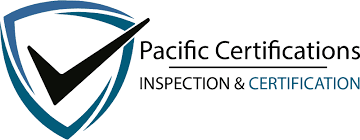ISO Certifications for Delivery Services Businesses, Requirements and Benefits
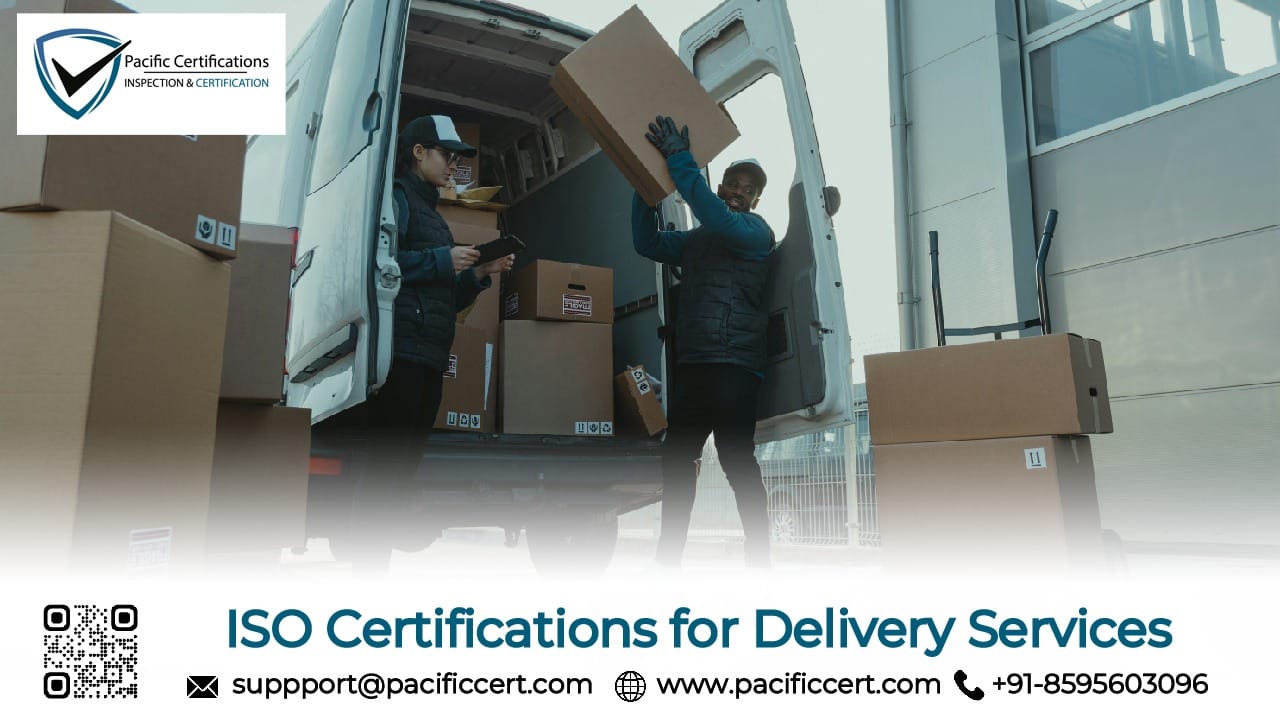
Introduction to ISO Standards for Delivery Services
Delivery services thrive on precision and customer satisfaction. With the industry growing exponentially, ISO certifications for delivery services have become a benchmark for quality, safety, and sustainability. These globally recognized standards help businesses streamline operations and remain competitive in a fast-evolving market.
ISO standards are internationally recognized frameworks designed to improve quality management and customer satisfaction. For delivery services, adhering to ISO standards ensures compliance with global best practices and builds trust among stakeholders.
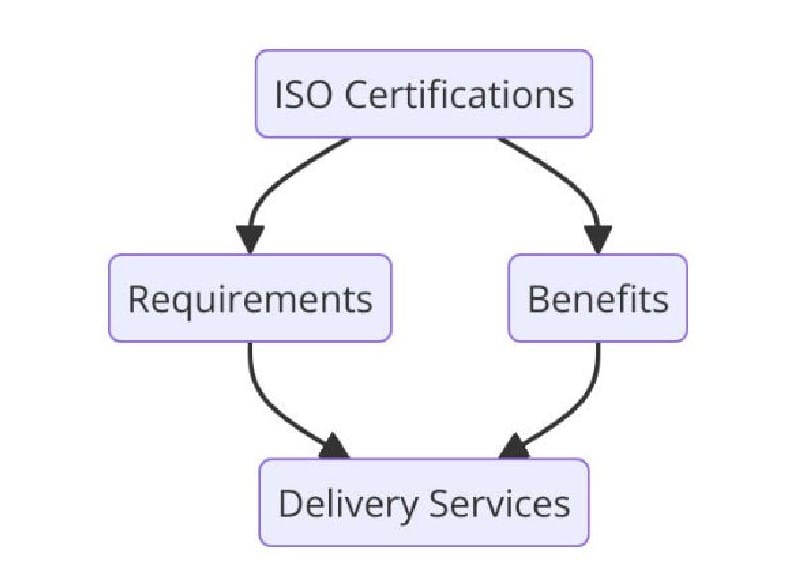
The delivery services sector plays a pivotal role in the modern economy, supporting e-commerce, logistics, and last-mile delivery solutions. With increasing demand, companies must focus on process optimization and sustainability. ISO certifications provide a structured approach to achieving these goals, benefiting both the service provider and their clients.
If you're ready to elevate your delivery services with ISO certification, contact us today at [email protected] or call +91-8595603096.
Applicable ISO Standards for Delivery Services
Delivery services cover a broad spectrum, from package couriers to large-scale logistics providers. The following ISO standards are most applicable to this industry:
ISO 9001: Quality Management System (QMS)
ISO 9001 focuses on ensuring consistent service quality. For delivery services, it sets guidelines for monitoring customer satisfaction, managing complaints, and enhancing operational efficiency.
ISO 14001: Environmental Management System (EMS)
This standard emphasizes environmental sustainability, helping delivery companies reduce their carbon footprint, manage waste effectively, and comply with environmental regulations.
ISO 45001: Occupational Health and Safety (OHS)
Employee safety is a priority for delivery services. ISO 45001 outlines measures to reduce workplace hazards, enhance worker well-being, and foster a safety-first culture.
ISO 31000: Risk Management
Risk assessment is vital in delivery services, particularly for logistics operations and hazardous goods transport. ISO 31000 provides a framework for identifying, analyzing, and mitigating risks effectively.
ISO 26000: Social Responsibility
As consumers increasingly prioritize ethical practices, ISO 26000 helps delivery companies demonstrate corporate social responsibility through sustainable practices and ethical labor policies.
ISO 27001: Information Security Management
With delivery services relying on data for routing and tracking, securing client information is critical. ISO 27001 ensures robust data protection measures, safeguarding sensitive information.
ISO 22301: Business Continuity Management
Unforeseen disruptions like natural disasters or cyberattacks can impact delivery services. ISO 22301 provides guidelines to ensure continuity of operations and minimize downtime.
Click here to find out more applicable standards to your industry
At Pacific Certifications, we specialize in auditing and issuing ISO certifications tailored to your business needs. Our experienced auditors work diligently to evaluate your compliance with ISO standards, providing you with globally recognized certifications.
Whether you're a startup or an established delivery service provider, ISO certification through Pacific Certifications enhances your credibility and positions you as a leader in the industry.
Ensure compliance and quality with ISO certification! Email us at [email protected] or give us a call at +91-8595603096 to get started.
Requirements of ISO Certifications for Delivery Services
Meeting the requirements of various ISO standards for delivery services ensures compliance with global best practices. Below are the key requirements for each applicable standard:
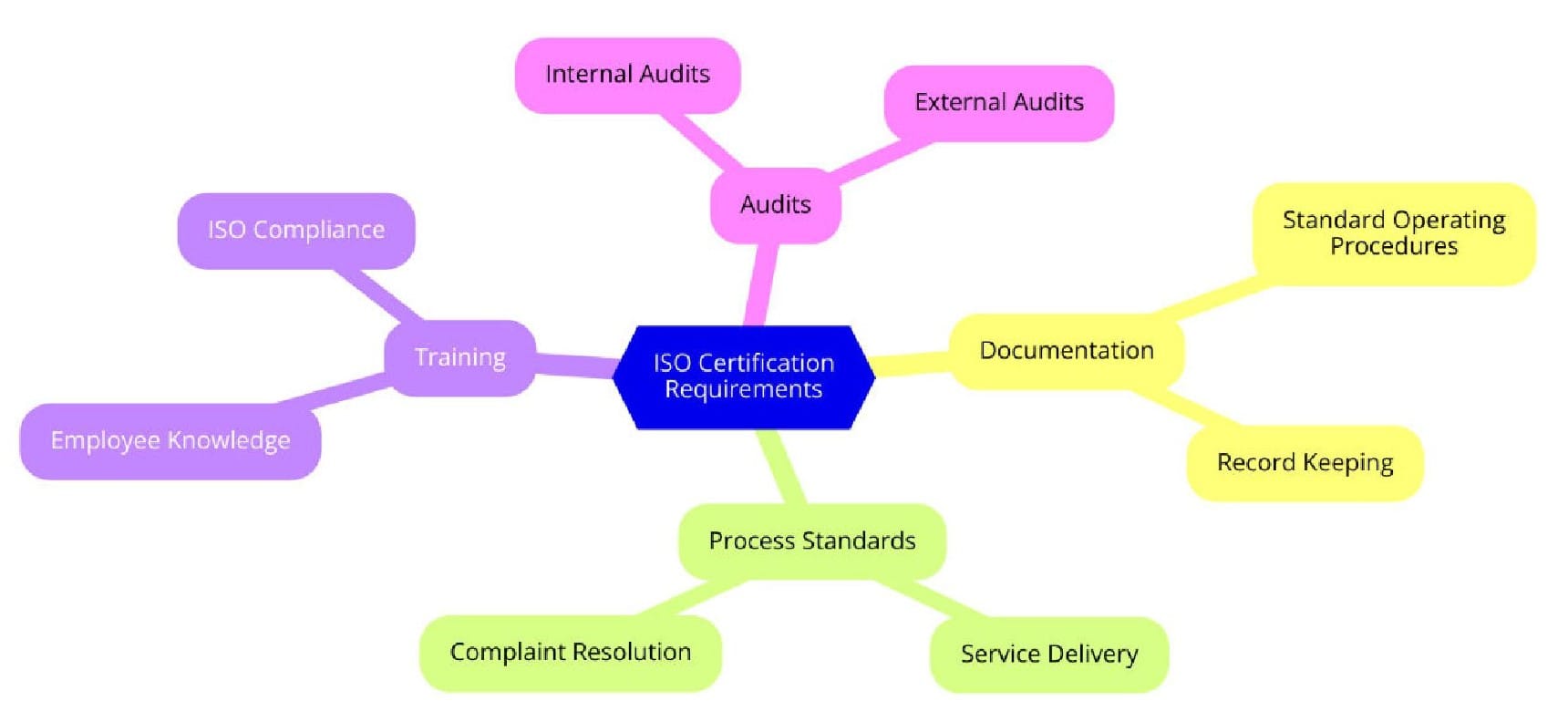
ISO 9001: Quality Management System (QMS) Requirements
Objective: Ensure consistent quality in delivery services.
- Documented Processes
- Develop a quality manual detailing delivery workflows, customer service protocols, and improvement measures.
- Maintain records of service performance and quality audits.
- Customer Focus
- Regularly gather customer feedback to identify improvement areas.
- Address complaints promptly and analyze root causes.
- Leadership and Commitment
- Management must demonstrate commitment to quality objectives.
- Allocate resources to ensure the effectiveness of the QMS.
- Risk-Based Thinking: Identify potential risks in delivery operations and establish mitigation strategies.
- Performance Monitoring: Use key performance indicators (KPIs) to track service quality.
ISO 14001: Environmental Management System (EMS) Requirements
Objective: Promote environmentally sustainable practices.
- Environmental Policy
- Define an organizational commitment to reducing environmental impact.
- Communicate the policy internally and externally.
- Environmental Aspects and Impacts
- Identify activities causing environmental harm, such as vehicle emissions or packaging waste.
- Develop controls to minimize these impacts.
- Compliance Obligations: Adhere to local and international environmental regulations.
- Objectives and Targets: Set measurable environmental goals, such as reducing carbon emissions by a specific percentage.
- Operational Controls: Implement eco-friendly transportation methods, such as electric vehicles.
ISO 45001: Occupational Health and Safety (OHS) Requirements
Objective: Ensure worker safety and well-being.
- Hazard Identification: Conduct risk assessments to identify hazards like road accidents, manual handling injuries, or exposure to hazardous goods.
- Safety Policy: Develop and implement a health and safety policy.
- Employee Participation: Engage employees in safety initiatives and provide appropriate training.
- Incident Response: Establish procedures for reporting and investigating workplace accidents.
- Compliance: Meet regulatory requirements related to worker safety.
ISO 31000: Risk Management Requirements
Objective: Anticipate and mitigate risks in delivery operations.
- Risk Assessment: Identify risks, such as delivery delays, theft, or data breaches.
- Risk Treatment: Develop and implement strategies to reduce or eliminate risks.
- Monitoring and Review: Regularly review risk management processes and outcomes.
- Communication: Keep all stakeholders informed about risk management strategies.
ISO 26000: Social Responsibility Requirements
Objective: Ensure ethical and socially responsible operations.
- Organizational Governance: Demonstrate ethical decision-making processes.
- Labor Practices: Adhere to fair labor standards, including equitable wages and safe working conditions.
- Community Engagement: Contribute to local community development through responsible business practices.
- Sustainability Initiatives: Implement measures to reduce resource consumption and support social causes.
ISO 27001: Information Security Management Requirements
Objective: Protect sensitive data related to delivery operations.
- Information Security Policy: Create and enforce a data protection policy.
- Risk Assessment: Identify threats to data security, such as hacking or unauthorized access.
- Access Control: Restrict data access to authorized personnel only.
- Incident Response Plan: Develop protocols for addressing data breaches or cyberattacks.
ISO 22301: Business Continuity Management Requirements
Objective: Ensure uninterrupted service during disruptions.
- Business Impact Analysis (BIA): Assess potential impacts of disruptions on delivery operations.
- Continuity Plan: Develop strategies for maintaining service during emergencies, such as natural disasters or IT failures.
- Testing and Training: Conduct regular drills to ensure the effectiveness of continuity plans.
- Resource Allocation: Ensure availability of resources necessary to execute the continuity plan.
By meeting these detailed requirements for each ISO standard, delivery service providers can build a robust framework for quality, safety, and sustainability while enhancing their reputation in a competitive industry.
Looking for ISO certification to improve your delivery service standards? Contact us at [email protected] or dial +91-8595603096 to learn more.
Benefits of ISO Certifications for Delivery Services
ISO certifications are more than just compliance tools—they are strategic assets. Here are the advantages of obtaining ISO certifications for delivery services:
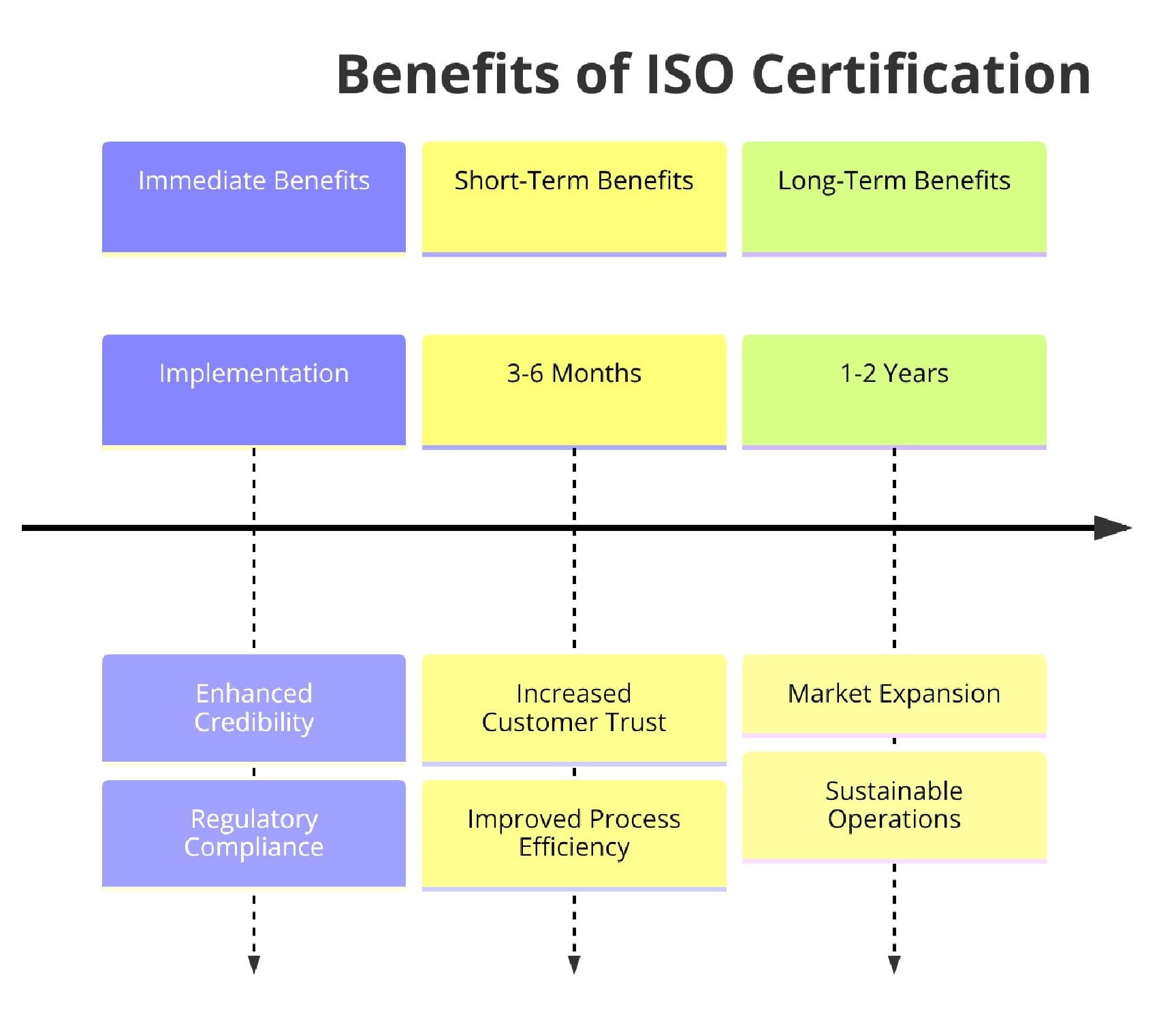
- Operational Efficiency: ISO standards streamline processes, reducing errors and enhancing the speed of service delivery.
- Customer Satisfaction: Consistent service quality builds trust and fosters long-term client relationships.
- Competitive Edge: ISO certifications differentiate your business in a competitive market, attracting more clients and partnerships.
- Sustainability and Compliance: Standards like ISO 14001 and ISO 45001 ensure environmentally friendly and safe operations, meeting regulatory requirements.
- Risk Mitigation: With ISO 31000 and ISO 22301, delivery services can anticipate and mitigate risks, ensuring business continuity.
- Employee Morale: By implementing safety and quality measures, ISO certifications foster a positive work environment, boosting employee morale.
Achieve excellence with ISO certification for delivery services. Email [email protected] or connect with us at +91-8595603096 for a seamless certification process.
Market Trends
The delivery services industry is experiencing transformative changes in this year, driven by technological advancements and growing consumer expectations. A recent market report highlights the following trends:
- Adoption of Green Logistics: Delivery companies are prioritizing eco-friendly solutions, aligning with ISO 14001 standards. Electric vehicles, sustainable packaging, and carbon offset programs are on the rise.
- Increased Focus on Cybersecurity: With e-commerce expanding, ISO 27001 has gained prominence as companies safeguard customer data against cyber threats.
- Digital Transformation: Automation and AI are reshaping delivery processes, creating opportunities for better compliance with ISO standards like 9001 and 31000.
Staying ahead of these trends requires a commitment to ISO certifications, ensuring resilience and adaptability in a dynamic market.
Elevate your delivery service operations with ISO certifications. Pacific Certifications is your trusted partner in achieving globally recognized standards.
Our comprehensive certification process ensures your business meets industry benchmarks, enhancing reputation and operational excellence.
Pacific Certifications is accredited by ABIS, in case you need support with ISO certification for your Delivery Services business, please contact us at [email protected] or +91-8595603096.
Ready to get ISO certified?
Contact Pacific Certifications to begin your certification journey today!
Suggested Certifications –
Read more: Pacific Blogs
